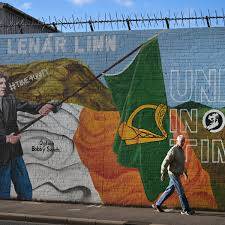Even More Thoughts on Irish Unity

This month Sinn Féin leaders were in London to campaign for an Irish Unity referendum within the next 5 years. The SF leader Mary Lou McDonald was on national UK television making her case for a referendum, while also highlighting the need to initiate discussions at an early stage on how the structures of both statelets, the 6 Counties in the North and Free State in the South, may be amalgamated before a vote on Irish reunification takes place. In this regard the success of reunification would depend upon a coherent amalgamation of both economies, social systems and in policing and legal frameworks and so on. This is fundamental to the success of Irish reunification and it is indeed sensible to set the scene well in advance so as to make the transition as smooth as possible.
Indeed the key point reiterated by McDonald throughout was that the process and referendum shall be subject to a democratic process, and therefore in essence be sacrosanct. Meaning that whatever the outcome Unionists and Nationalists alike must accept and abide by it come what may. Indeed in the event of reunification it is vital that Unionism and Loyalism be allowed to express and celebrate their cultural differences as they see fit while playing an active role in government and in developing fiscal policy within the 32 Counties of Ireland.
Of course this is all easier said and done and I am assuming that McDonald and Sinn Féin are all too aware and are prepared for the stark reality inherent to a reunification referendum. Firstly, any call for a reunification referendum depends solely on the British government, with the underlying mechanics of the referendum or ‘border poll’ designed to recognise and copper fasten partition. It is perhaps telling how Sinn Féin appear to have dropped the term ‘border poll’ in this latest campaign, but nevertheless the process will in fact involve two referendums each to be taken individually. One referendum in the Northern 6 Counties and the other in the remaining 26 in the South, and moreover both to be called at not necessarily the same time. This is something Sinn Féin have accepted for it is no secret that they have conceded the long held party line that an all Ireland vote must be allowed to take place subject to the wishes of the Irish people made in 1918 and ratified by the First Dáil in 1919, and all before the war of Independence and partition of Ireland in 1921. This is a key point as it is one where the opinions of other strands of Irish republicans would diverge dramatically. Yet evidently Sinn Féin are in this for the long game and by accepting the partitionist line they wish to convince Northern Unionism that they have nothing to fear from a reunified Ireland.
Another issue is the criteria required for the British to even consider a border poll, with the key word here being ‘consider’, for even if such criterions are met there can be no guarantee that a border poll will arise. The driving criteria required is one whereby there must be clear evidence that people in the 6 Counties, the number of which must be at or close to a majority would have a wish or want for reunification via a border poll. Yet this in itself may be hard to prove as opinion polls and surveys on the subject have varied significantly from year to year with results depending upon the methodologies of the surveys and on the entities who control them. In this regard there is a case for more objective criteria to be implemented along with a third party to provide independent surveys that can be in no way biased or tainted [1]. From this it is clear that the underlying mechanics of any referendum on Irish unity are strongly biased towards the interests of Britain in Ireland, and this is something that must be addressed to ensure fairness and due process, and in effect the very democratic process that is so required.
Finally, in the event of a successful poll on Irish reunification the intransigence of some elements of Unionism and Loyalism will have to be dealt with. Such elements will put up significant resistance and barriers with violence and terrorism being used in all likelihood. To eradicate this problem such undemocratic elements will need to be put down by the new policing and legal framework alluded to previously, or failing that through other mechanisms which may or may not result in a civil war type scenario.
In conclusion it is evident that the successful implementation of Irish reunification via a border poll in it’s current format will be a Herculean task. Moreover it is absolutely fundamental that any referendum and reunification be subject to a democratic process, yet in my view to truly achieve this the criteria required for the British Secretary of State to call for a border poll must be revised to set clear parameters to ensure the grounds for such a referendum are certain. Finally, whatever the circumstances or conditions it is clear that in today's political climate it is far more efficacious to live for Ireland than to die for it.
~ Gamhain MacCionaoith
26ú Iúil 2025
[1] Criteria for calling a border poll in Northern Ireland. Submission to the Constitution Unit Working Group on Unification Referendums on the Island of Ireland. Professor Jon Tonge, Department of Politics, University of Liverpool.
Create Your Own Website With Webador